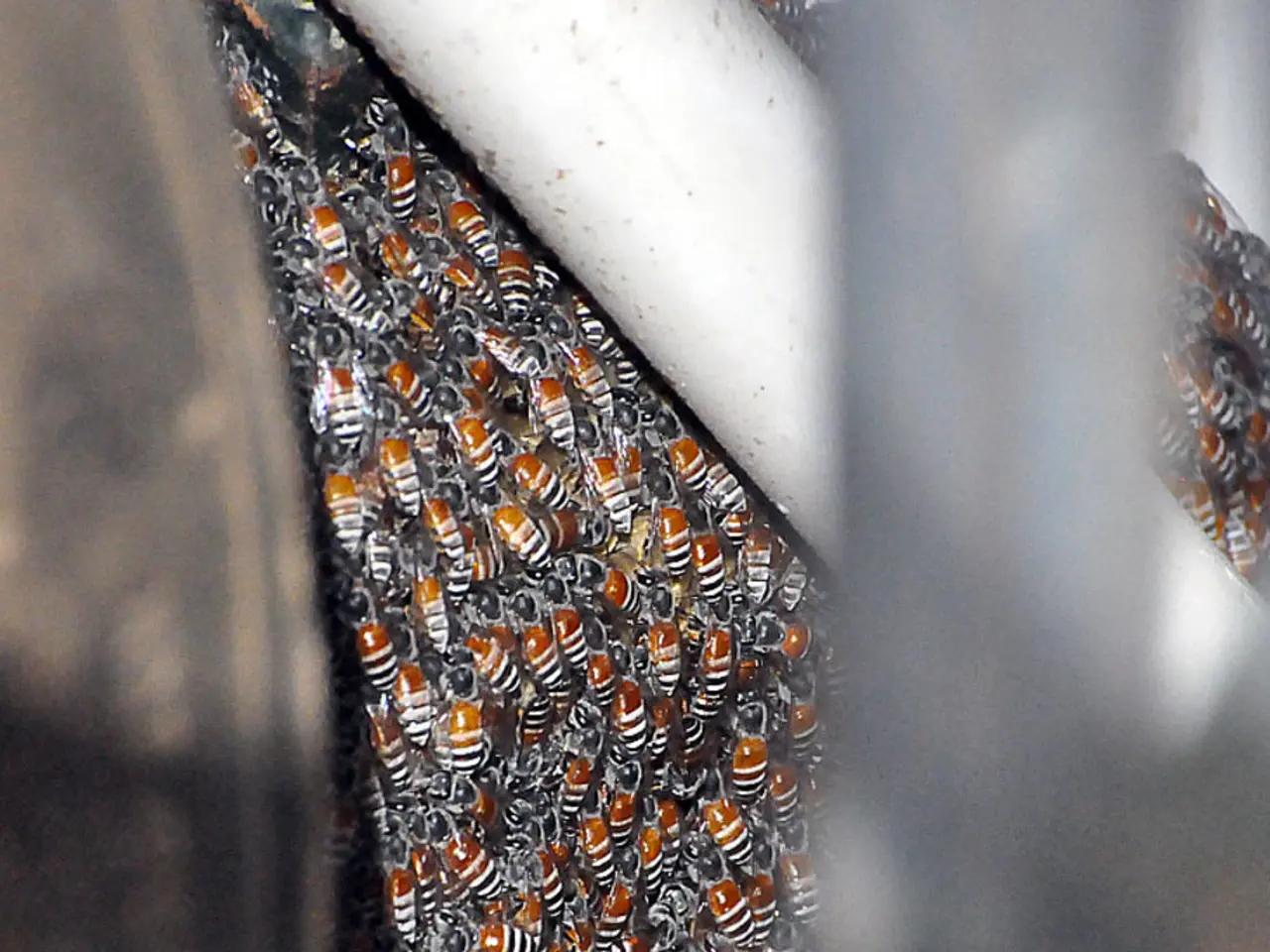Significance of Bees to Humanity and Earth: An Examination of Their Crucial Role
Unsung Heroes of Our Planet: The Invaluable Bees
There are over 20,000 species of bees roaming the globe, from the beloved honey bee to the lesser-known ones. The impact of these tiny insects on our lives is immense, reaching far beyond the sweet nectar they produce. Let's dive into the essential role bees play in our world.
Four Solid Reasons For Their Importance
You might wonder why there's all the fuss about saving the bees. Well, here are four compelling reasons that make them invaluable.
1. Bees Fuel Our Food
Bees act as busy pollinators, vital to many of our favorite food crops. They zip from flower to flower collecting pollen, providing a crucial service while doing so. Did you know that around 35% of our worldwide food supply depends on insect pollination? Much more of our food relies on bees, particularly in the northern hemisphere.
In Europe alone, pollinators help grow over 84% of food crops, while in the U.S., a whopping 75% of crops depend on bees - that's more than 100 major crops - yielding an additional $18 billion in economic value every year. Bees contribute to the growth of other non-food plants as well, which provide food and shelter for other creatures.
Without bees, our diets would be considerably more limited, and some foods that are almost entirely bee-pollinated, like cherries, blueberries, and almonds, might disappear.
2. Bees Supply Gold in a Jar (and More)
Beyond providing us with food, honeybees bring us so much more - delightful honey and other precious substances. Did you know that in the U.S. alone, over $700 million worth of honeybee products are sold each year? Let's take a closer look at some popular honeybee products.
Honey
We've enjoyed the sweet goodness of honey for thousands of years, as it's reported to have nutrients with antioxidant, natural cleansing, and wellness-supporting properties. And that's not all - honey is gaining popularity as a natural sweetener and alternative to refined table sugar. There are more than 94 million honeybee hives worldwide that produce around 1.77 million metric tons of honey annually.
Beeswax
Beeswax, a mix of organic compounds secreted by honeybees, is used in cosmetics, weatherproofing, fuel, candle making, and more.
Other Valuable Bee Products:
- Bee bread or bee pollen
- Royal jelly
- Bee venom
3. Bees Strengthen the Ecosystem
But bees' impact doesn't stop there. Bees also provide support to the entire ecosystem, as around 90% of the world's flowers rely on pollinators.
4. Bees Hold Historical Significance
Bees have played an essential role in human culture and history for thousands of years. From ancient cave paintings to mentions in important religious texts, bees have remained historically and culturally significant within countless societies.
The Decline of Our Buzzing Buddies
Alarm bells are ringing among environmental experts, beekeepers, and nature lovers alike as bee populations are on the decline worldwide. In April 2021, a survey of U.S. beekeepers found that 45.5% of managed honeybee colonies were lost in the previous year - the highest percentage since the survey's founding in 2006.
So what's causing this decline? Let's take a look.
The Top Culprits
- Pesticides: Bees are exposed to harmful pesticides, which can have negative effects on their reproduction, navigation, learning, feeding, and nest recognition.
- Air Pollutants: Studies have shown that air pollutants can affect the scent molecules released by plants, confusing bees when they search for food sources.
- Climate Change: Heavy rainfall, wildfires, floods, extreme temperatures, and drought can impact bees and their behavior, opening the door to parasites and disease.
- Habitat Loss & Biodiversity Loss: With half the world's land now developed, and much of it supporting intensive farming practices, bee habitats are becoming fragmented or disappearing altogether.
What Can We Do To Save the Bees?
So what can we do to help our buzzing friends and protect our food supply?
- Support ethical beekeeping practices that preserve the health and happiness of bees and promote a sustainable environment. Look for products certified as ethically sourced or produced.
- Plant a pollinator garden that offers shelter and food to bees, hummingbirds, butterflies, and other native pollinators.
- Avoid harmful chemicals and promote sustainability by using natural, pesticide-free products in your yard and garden.
- Building a "bee hotel" for local wild bees and solitary bees can provide shelter and create a friendly environment for them.
Key Takeaways
Bees play an integral role in our diets, producing around 35% of the food we love, and they hold cultural and historical significance in human cultures worldwide. However, bee populations are dwindling, and changes must be made to protect them. By implementing sustainable practices, supporting ethical beekeeping, and creating pollinator-friendly environments, we can help ensure a prosperous future for bees and humankind alike.
- Science has shown that around 35% of our worldwide food supply depends on insect pollination, mainly by bees.
- In Europe, pollinators help grow over 84% of food crops, while in the U.S., a staggering 75% of crops depend on bees.
- Bees contribute to the growth of other non-food plants as well, which provide food and shelter for other creatures.
- Many of our favorite food crops, like cherries, blueberries, and almonds, rely heavily on bees for pollination.
- Honeybees produce around 1.77 million metric tons of honey annually across 94 million hives worldwide.
- Honey has nutritional properties, serving as a natural sweetener and alternative to refined table sugar.
- Beeswax is used in cosmetics, weatherproofing, fuel, candle making, and more.
- Bee bread or bee pollen, royal jelly, and bee venom are other valuable products derived from honeybees.
- Around 90% of the world's flowers rely on pollinators, and bees play a crucial role in pollination.
- Bees have been historically and culturally significant within numerous societies for thousands of years.
- In April 2021, a survey found that 45.5% of managed honeybee colonies were lost in the previous year, which is the highest percentage since the survey's founding in 2006.
- The decline of bees is due to factors such as pesticides, air pollutants, climate change, habitat loss, and biodiversity loss.
- Pesticides can negatively impact bees' reproduction, navigation, learning, feeding, and nest recognition.
- Air pollutants can affect the scent molecules released by plants, confusing bees when they search for food sources.
- Climate change can impact bees and their behavior, opening the door to parasites and disease.
- Half the world's land is now developed, with intensive farming practices fragmenting or destroying bee habitats.
- To help save bees, we should support ethical beekeeping practices that promote a sustainable environment.
- Planting a pollinator garden can provide shelter and food for bees, hummingbirds, butterflies, and other native pollinators.
- Avoiding harmful chemicals and using natural, pesticide-free products in your yard and garden can protect bees.
- Building a "bee hotel" can offer shelter and create a friendly environment for local wild bees and solitary bees.
- Health-and-wellness products like cosmetics and natural cleansers can contain ingredients derived from bees and other pollinators.
- Fitness-and-exercise routines can boost the immune system and help fight medical-conditions like chronic diseases, certain cancers, and respiratory conditions.
- Skin-care routines containing honey, beeswax, and other bee products can improve eye-health, hearing, and overall skin health.
- Therapies-and-treatments for autoimmune disorders, neurological disorders, and skin-conditions can benefit from research in environmental-science and medical-conditions.
- Aging-well involves good nutrition, regular exercise, and maintaining mental, sexual-health, and cardiovascular-health.
- Mothers and fathers must prioritize womens-health and mens-health during their parenting to ensure the well-being of their children and themselves. Weight-management plays a role in maintaining health and wellness.








